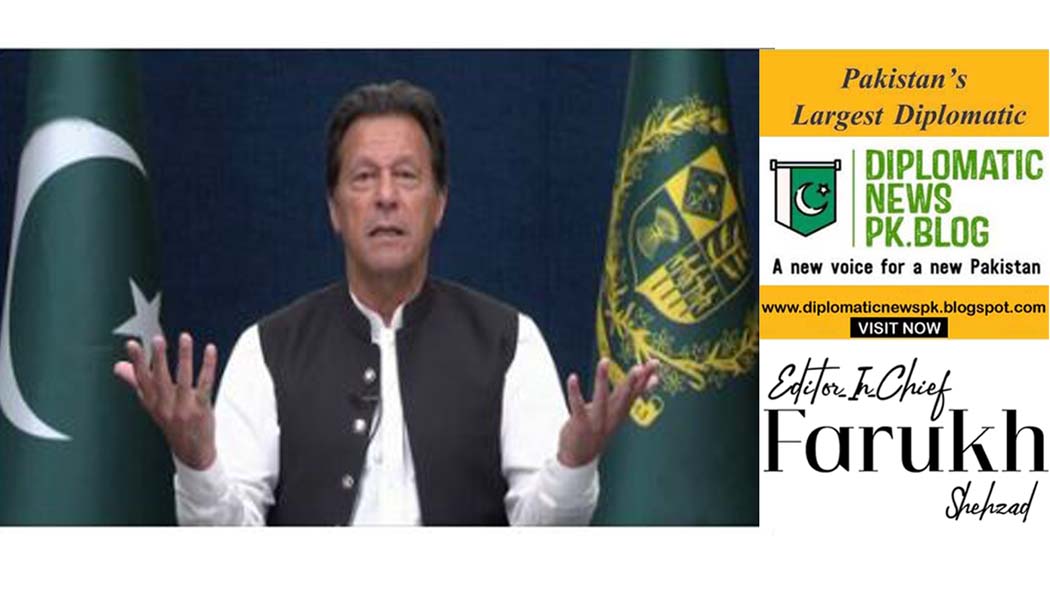ISLAMABAD, APR 1: The National Security Committee (NSC) decided on Thursday to issue a "strong demarche" to a country, that it did not name, over a 'threat letter' — purportedly showing evidence of a foreign conspiracy to oust the PTI-led government — terming it "blatant interference in the internal affairs of Pakistan".
The meeting of the NSC, which is the highest forum for coordination on security issues, was chaired by Prime Minister Imran Khan. It was attended by ministers for defence, energy, information and broadcasting, interior, finance, human rights, planning, development and special initiatives, chairman joint chiefs of staff committee, services chiefs, national security adviser and senior officers.
According to a statement issued by the Prime Minister's Office (PMO), NSA Moeed Yusuf briefed the committee about the "formal communication of a senior official of a foreign country" to Pakistan's ambassador in that country in a formal meeting which was subsequently conveyed.
"The committee expressed grave concern at the communication, terming the language used by the foreign official as undiplomatic," the statement said, adding that the meeting concluded that it amounted to "blatant interference in the internal affairs of Pakistan by the country in question".
It termed the interference "unacceptable under any circumstances".
"The committee decided that Pakistan will issue a strong demarche to the country in question both in Islamabad and in the country's capital through proper channel in keeping with diplomatic norms," according to the statement.
The meeting's participants also endorsed the federal cabinet's decision to take the parliament into confidence about the letter in an in-camera session that was held today at Parliament House. However, the opposition did not attend it, according to Planning and Development Minister Asad Umar.
The development comes a day after the premier shared the letter with his cabinet members in a hurriedly called meeting, which was not attended by PTI's two major allies — Muttahida Qaumi Movement-Pakistan (MQM-P) and Balochistan Awami Party (BAP) — despite being invited. It has been learnt that the letter was shown to the cabinet members on a TV screen.
PM Imran also called a selected group of TV anchors and informed them that "the language of the letter was threatening and arrogant" and that Pakistan would face dire consequences if the no-confidence motion failed.
However, the premier did not show the letter to the media.
This rush to share the 'secret letter' with the cabinet and some journalists came after it became clear that the prime minister had lost his majority in the National Assembly (NA) following the MQM-P's decision to support the joint opposition in the no-trust resolution against the prime minister.
A key ally of the PTI government in the Centre, the MQM-P has seven seats in the NA and after its decision to part ways with the government, the opposition has gathered the support of 177 MNAs, five more than the 172 required to gain a majority.
Yesterday, Chief of the Army Staff (COAS) met PM Imran twice after which some ministers claimed that neither the premier had been asked to resign nor would he opt for it.
The 'threat letter' first surfaced on Sunday during PTI's public rally, where the PM brandished it as evidence of a "foreign conspiracy" to oust him, asking his party dissidents, as well as disgruntled allies, to change their minds and avoid becoming part of a "foreign plot" against him.
Information Minister Fawad Chaudhry had told Dawn yesterday that PM Imran had decided to present the 'secret letter' during an in-camera session of the NA or a joint session of parliament, however, no date for when such a session would be called was given.
In a tweet, National Assembly Speaker Asad Qaisar had stated: "If the parliamentary leaders from the government and the opposition side agree, the issue of the sensitive letter can be discussed at an in-camera meeting of the Parliamentary Committee on National Security."
The National Assembly session will resume today at 4pm after a recess of three days, with debate on the no-trust resolution on the agenda. Voting on the resolution is expected to take place on April 3.
The letter
In the PTI's public meeting in Islamabad on Sunday, the premier had pulled out a piece of paper from his pocket and waved it at the crowd, claiming it was evidence of an "international conspiracy" being hatched to topple his government.
"Foreign funding is being used to change the government. Money is coming from abroad and people inside the country are being used. Some of them are unaware they are being used and some are intentionally using this money against us," he had alleged.
In a joint press conference on Tuesday, Minister for Planning and Development Asad Umar and Information Minister Chaudhry said the prime minister had agreed to present the letter to Chief Justice of Pakistan Umar Ata Bandial.
"If someone has doubts, the prime minister says if necessary, and for the people's satisfaction, he is ready to present the letter to the chief justice of the SC, as he enjoys a good reputation," Umar said, adding that only three to four people, including him, had seen the letter.
"The letter has been shared with the top civil and military leadership and only two or three cabinet members," he added.
--------------------------------------------------------
Courtesy Dawn News
----------------------




